仁爱版英语七年级下册知识点梳理
仁爱版七年级(下册)知识点要点总结

仁爱版七年级(下册)知识点要点总结本学期研究的知识点包括:
语文
- 形音义的关系
- 修辞手法的运用
- 古诗文的鉴赏
- 现代文阅读与写作
数学
- 相反数与绝对值
- 分数加减乘除
- 二次根式与平方根
- 整式的加减乘除
英语
- 现在进行时
- 祈使句
- 简单过去式
- 数词与日期
历史
- 秦汉和尚书制的改革- 西汉时期的政治和军事- 东汉时期的政治和文化- 三国时期的政治和文化
生物
- 细胞的基本结构和功能- 生物多样性的认识
- 植物的结构和生长
- 动物的体内环境和调节
地理
- 中国的地理位置和自然地理条件
- 中国的人口与经济
- 中国的交通和旅游
- 国际热点问题的认知
政治
- 报告的主要内容
- 中国特色社会主义的本质特征
- 社会主义核心价值观的内涵与精神实质
- 当前的国际形势和中国与世界的关系
以上是本学期主要的知识点汇总。
在学习各科知识的同时,要
注意拓展视野、强化思维训练,努力提高语言表达能力、计算能力、探究能力和综合应用能力。
最新仁爱版七年级英语下册期末知识点总复习
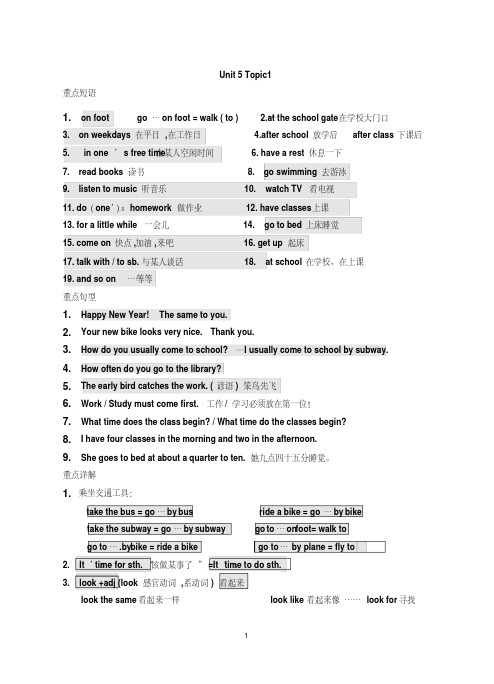
Unit 5 Topic1重点短语1.on foot go …on foot = walk ( to )… 2.at the school gate在学校大门口3. on weekdays 在平日 ,在工作日4.after school 放学后after class 下课后在某人空闲时间 6. have a rest 休息一下5. in one’s free time7. read books 读书8. go swimming 去游泳9. listen to music 听音乐10. watch TV 看电视11. do(one’s)homework 做作业12. have classes 上课13. for a little while 一会儿14. go to bed 上床睡觉15. come on 快点,加油,来吧16. get up 起床17. talk with / to sb.与某人谈话18. at school 在学校、在上课19. and so on ……等等重点句型1.Happy New Year! The same to you.2.Your new bike looks very nice. Thank you.3.How do you usually come to school? —I usually come to school by subway.4.How often do you go to the library?5.The early bird catches the work. (谚语) 笨鸟先飞6.Work / Study must come first. 工作/ 学习必须放在第一位!7.What time does the class begin? / What time do the classes begin?8.I have four classes in the morning and two in the afternoon.9.She goes to bed at about a quarter to ten. 她九点四十五分睡觉。
(完整版)仁爱版七年级英语下册知识点总结
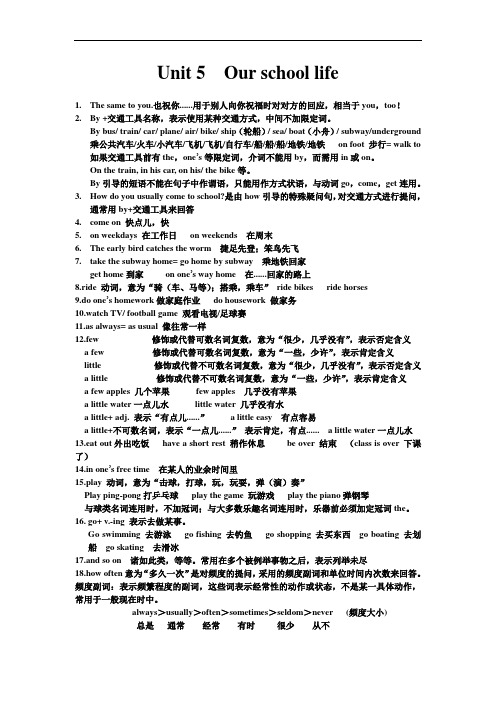
Unit 5 Our school life1.The same to you.也祝你......用于别人向你祝福时对对方的回应,相当于you,too!2.By +交通工具名称,表示使用某种交通方式,中间不加限定词。
By bus/ train/ car/ plane/ air/ bike/ ship(轮船)/ sea/ boat(小舟)/ subway/underground 乘公共汽车/火车/小汽车/飞机/飞机/自行车/船/船/船/地铁/地铁on foot 步行= walk to 如果交通工具前有the,one’s等限定词,介词不能用by,而需用in或on。
On the train, in his car, on his/ the bike等。
By引导的短语不能在句子中作谓语,只能用作方式状语,与动词go,come,get连用。
3.How do you usually come to school?是由how引导的特殊疑问句,对交通方式进行提问,通常用by+交通工具来回答e on 快点儿,快5.on weekdays 在工作日on weekends 在周末6.The early bird catches the worm 捷足先登;笨鸟先飞7.take the subway home= go home by subway 乘地铁回家get home到家on one’s way home 在......回家的路上8.ride 动词,意为“骑(车、马等);搭乘,乘车”ride bikes ride horses9.do one’s homework做家庭作业do housework 做家务10.watch TV/ football game 观看电视/足球赛11.as always= as usual 像往常一样12.few 修饰或代替可数名词复数,意为“很少,几乎没有”,表示否定含义a few 修饰或代替可数名词复数,意为“一些,少许”,表示肯定含义little 修饰或代替不可数名词复数,意为“很少,几乎没有”,表示否定含义a little 修饰或代替不可数名词复数,意为“一些,少许”,表示肯定含义a few apples 几个苹果few apples 几乎没有苹果a little water一点儿水little water 几乎没有水a little+ adj. 表示“有点儿......” a little easy 有点容易a little+不可数名词,表示“一点儿......”表示肯定,有点...... a little water一点儿水13.eat out外出吃饭have a short rest 稍作休息be over 结束(class is over 下课了)14.in one’s free time 在某人的业余时间里15.play 动词,意为“击球,打球,玩,玩耍,弹(演)奏”Play ping-pong打乒乓球play the game 玩游戏play the piano弹钢琴与球类名词连用时,不加冠词;与大多数乐趣名词连用时,乐器前必须加定冠词the。
(仁爱版)英语七年级下册知识点归纳与总结
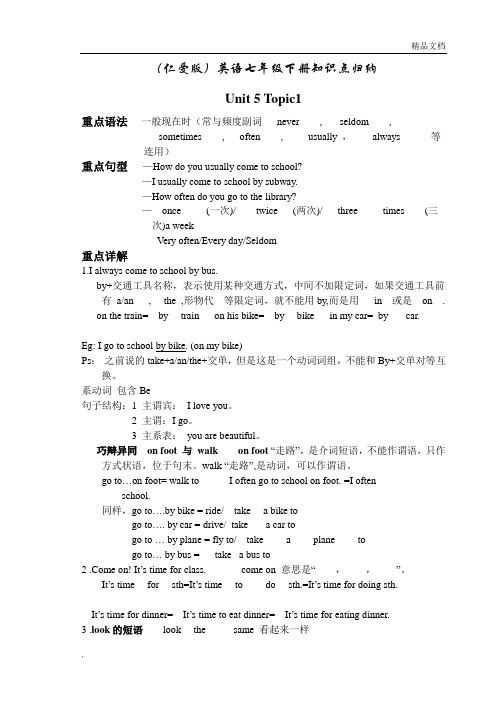
(仁爱版)英语七年级下册知识点归纳Unit 5 Topic1重点语法一般现在时(常与频度副词___never____, ___seldom____,___sometimes____,___often____, ___usually_,____always______等连用)重点句型—How do you usually come to school?—I usually come to school by subway.—How often do you go to the library?—__once_____(一次)/____twice___(两次)/___three ___times____(三次)a weekVery often/Every day/Seldom重点详解1.I always come to school by bus.by+交通工具名称,表示使用某种交通方式,中间不加限定词,如果交通工具前有_a/an___, __the_,形物代_ 等限定词,就不能用by,而是用___in__或是__on__.on the train=__by__ train on his bike=__by__ bike in my car=_by___ car.Eg: I go to school by bike. (on my bike)Ps:之前说的take+a/an/the+交单,但是这是一个动词词组,不能和By+交单对等互换。
系动词包含Be句子结构:1 主谓宾:I love you。
2 主谓:I go。
3 主系表:you are beautiful。
巧辩异同on foot 与walk on foot “走路”,是介词短语,不能作谓语,只作方式状语,位于句末。
walk “走路”,是动词,可以作谓语。
go to…on foot= walk to I often go to school on foot. =I often ________school.同样,go to….by bike = ride/__take__ a bike togo to…. by car = drive/_take___ a car togo to … by plane = fly to/__take__ __a__ __plane__ __to__go to… by bus =___take_ a bus to2 .Come on! It’s time for class. come on 意思是“____,____,____”。
仁爱英语七年级下册知识点归纳
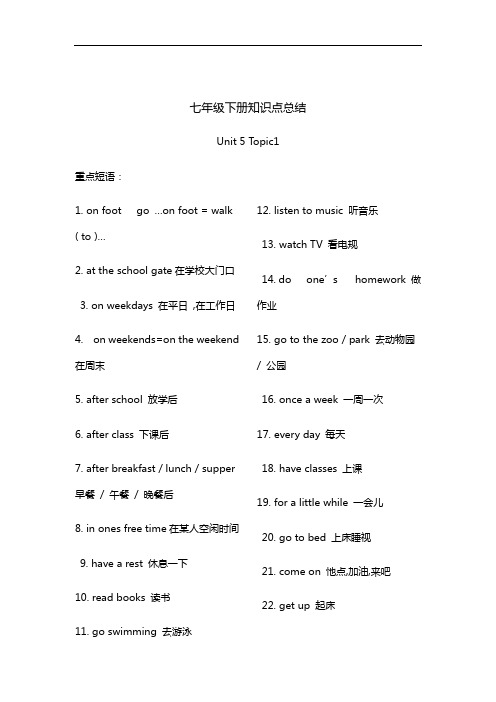
七年级下册知识点总结Unit 5 Topic1重点短语:1. on foot go …on foot = walk ( to )…2. at the school gate在学校大门口3. on weekdays 在平日,在工作日4. on weekends=on the weekend 在周末5. after school 放学后6. after class 下课后7. after breakfast / lunch / supper 早餐/ 午餐/ 晚餐后8. in ones free time在某人空闲时间9. have a rest 休息一下10. read books 读书11. go swimming 去游泳12. listen to music 听音乐13. watch TV 看电规14. do one’s homework 做作业15. go to the zoo / park 去动物园/ 公园16. once a week 一周一次17. every day 每天18. have classes 上课19. for a little while 一会儿20. go to bed 上床睡视21. come on 忚点,加油,来吧22. get up 起床23. talk with / to sb.不某人谈话26. and so on ……等等24. at school 在学校、在上课25. go to school 去上学重点句型 1. Happy New Year! The same to you.2. Your new bike looks very nice. Thank you.3. How do you usually come to school? —I usually come to school by subway.4. How often do you go to the library?5. —Once/Twice/Three times a week/Very often/Every day/Sedom6. The early bird catches the work. (谚语) 笨鸟先飞7. Work / Study must come first. 工作/ 学习必须放在第一位8. Classes begin at eight. =Class begins at eight.9. What time does the class begin? / What time do the classes begin?10. We have no more time. 我们没有更多的时间了。
仁爱版英语七年级下册unit7重难点知识归纳总结
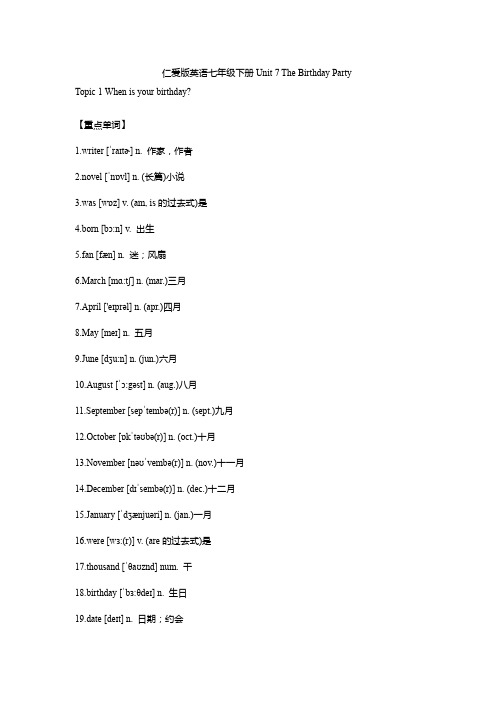
仁爱版英语七年级下册Unit 7 The Birthday Party Topic 1 When is your birthday?【重点单词】1.writer [ˈraɪtɚ] n. 作家,作者2.novel [ˈnɒvl] n. (长篇)小说3.was [wɒz] v. (am, is的过去式)是4.born [bɔ:n] v. 出生5.fan [fæn] n. 迷;风扇6.March [mɑ:tʃ] n. (mar.)三月7.April ['eɪprəl] n. (apr.)四月8.May [meɪ] n. 五月9.June [dʒu:n] n. (jun.)六月10.August [ˈɔ:gəst] n. (aug.)八月11.September [sepˈtembə(r)] n. (sept.)九月12.October [ɒkˈtəʊbə(r)] n. (oct.)十月13.November [nəʊˈvembə(r)] n. (nov.)十一月14.December [dɪˈsembə(r)] n. (dec.)十二月15.January [ˈdʒænjuəri] n. (jan.)一月16.were [wɜ:(r)] v. (are的过去式)是17.thousand [ˈθaʊznd] num. 千18.birthday [ˈbɜ:θdeɪ] n. 生日19.date [deɪt] n. 日期;约会20.calendar [ˈkælɪndə(r)] n. 日历21.plan [plæn] v. &n. 计划,打算22.celebrate ['selɪbreɪt] v. 庆祝23.party ['pɑ:tɪ] n. 聚会,宴会;党派24.fourth [fɔ:θ] num. 第四25.fifth [fɪfθ] num. 第五26.sixth [sɪksθ] num. 第六27.seventh ['sevnθ] num. 第七28.eighth [eɪtθ] num. 第八29.ninth [naɪnθ] num. 第九30.tenth [tenθ] num. 第十31.eleventh [ɪ'levnθ] num. 第十一32.twelfth [twelfθ] num. 第十二33.twentieth ['twentɪəθ] num. 第二十34.present ['preznt] n. 礼物35.shape [ʃeɪp] n. 形状v. 使成为……形状36.ball [bɔ:l] n. 球;舞会37.afraid [əˈfreɪd] adj. 担心;害怕38.star [stɑ:(r)] n. 星;明星39.mouse [maʊs] n. 老鼠40.square [skweə(r)] n. 正方形;广场;平方adj. 正方形的41.circle ['sɜ:kl] n. 圈,圆圈v. 圈出42.triangle ['traɪæŋɡl] n. 三角形43.rectangle [ˈrektæŋgl] n. 长方形;矩形44.oval ['əʊvl] n. 椭圆adj. 椭圆形的45.centimeter ['sentɪˌmi:tə] n. (cm)厘米46.Mrs. [ˈmɪsɪz] n. 太太,夫人47.cake [keɪk] n. 蛋糕【重点短语】1.be born 出生2.look at 看3.plan to do sth. 计划做某事4.have a birthday party 举办生日聚会5.the shape of ……的形状6.be like 像……7.how long 多长8.how wide 多宽e ... for ... 用……做……【重点句型】1.—When were you / was he/she born?你/他/她是什么时候出生的?—I/He/She was born on/in …我/他/她出生于……2.—Where were you / was he/she born?你/他/她在哪里出生的?—I/He/She was born in …我/他/她出生在……3.—When is your birthday?你的生日是什么时候?—May 13th.5月13号。
仁爱版七年级英语下册知识点总结

仁爱版七年级英语下册知识点总结仁爱版七年级英语下册知识点总结在日常过程学习中,说到知识点,大家是不是都习惯性的重视?知识点也可以通俗的理解为重要的内容。
哪些才是我们真正需要的知识点呢?以下是店铺为大家收集的仁爱版七年级英语下册知识点总结,仅供参考,大家一起来看看吧。
仁爱版七年级英语下册知识点总结 1㈠短语总结1. 在学校大门口 at the school gate2. 来学校 come to school3. 去学校 go to school4. 上课 have class / have classes5. 步行 on foot6. 骑自行车 ride a bike/ ride bikes/ by bike / on a bike7. 坐公交 by bus / take a bus8. 坐地铁 by subway / take the subway / on the subway9. 坐飞机 by plane/ take the plane / on the plane10. 坐小汽车 by car / in a car/ take a car/ drive a car11. 坐轮船 by ship12. 坐小船 by boat13. 坐火车 by train / on the train14. 在我们组 in our group15. 一群学生 a group of students16. 我们中的三个人 three of us17. 在平日 on weekdays18. 在周末 on the weekends / at weekends19. 起床 get up20. 睡觉 go to bed21. 早起 get up early22. 回家 go home23. 到家 get home24. 去动物园 go to the zoo25. 去公园 go to the park26. 看电影 see a movie / film27. 看电视 watch TV28. 在晚上 in the evening / at night29. 帮助父母 help parents30. 做某人的家庭作业do one’s ( my/ her/ his/ your/ their)homework31. 在学校 at school32. 知道,了解 know about / learn about33. 校园生活 school life34. 一个美国学生 an American student35. 在美国 in America / in the U.S.A.36. 许多学生many students/ a lot of students/ lots of students37. 很少 very few38. 吃午饭 have lunch39. 出去吃饭 eat out40. 在校期间 on school days41. 休息一会 have a short rest/ break42. 午饭后 after lunch43. 在某人的业余时间in one’s ( my/ his/ her/ their…)free/ spare time44. 打篮球 play basketball45. 踢足球play soccer / football46. 弹钢琴 play the piano47. 弹吉他play the guitar48. 拉二胡 play erhu49. 去游泳 go swimming / go for a swim50. 去划船 go boating51. 球赛 a ball game / ball games52. 一年四次 four times a year53. 听音乐 listen to music54. 读书 read books55. 看报 read newspapers56. 看医生 see a doctor57. 去图书馆 go to the library58. 一周两次 twice a week59. 见朋友 meet friends60. 每天 every day61. 在七点半 at half past seven62. 一小会 for a little while / for a short time63. 晚饭后 after supper64. 吃饭 have dinner65. 吃早饭 have breakfast㈡重要句型1. I usually come to school by subway.同义句: I usually take the subway to school.对划线部分提问: How do you usually come to school?类似的有:go to school by bike=go to schoolon a bike= ride a bike to school=ride to schoolgo home by bus=go home on a bus=take a bus home2. How do you us ually/ often…?你通常/经常怎样…?3. It’s time for class.=It’s time to have class. =It’s time for having class.4. What about you? =How about you?5. How often …? 询问频率,回答可以用频率副词:always,usually, often, sometimes, seldom, never, every day ,every +其他时间名词或表示频率的短语回答表示频率的短语:次数+单位时间e.g. : once a day / twice a week / three times a month6. The early bird catches the work. (谚语) 笨鸟先飞7. Work / Study must come first. 工作/ 学习必须放在第一位!8. Classes begin at eight. =Class begins at eight.提问: What time does the class begin? / What time do the classes begin?㈢重要单词的用法1. look (感官动词) 看起来,后面加形容词His mother looks very young.They look very cute.Her dress looks very nice.You look very cool in this coat.2. by 介词by 后面直接加表示交通工具的名词,中间不用任何词修饰,如:by bikeby +动词ing形式,表示通过某种方式People show love to their mothers by giving cards.You can be a good student by working hard.3. over (形容词)School / Class is over.4. begin现在分词: beginning 过去式: beganbegin to do sth , begin doing sthHe begins to write a letter. =He begins writing a letter.如果begin本身为分词,只能用begin to do sthHe is beginning to run.5. listen to 听(动作) , hear 听见(结果)6. always 反义词 never7. 本话题涉及的时态为一般现在时,句中常有频率副词或表示频率的短语,如果主语为三单,动词一定要用三单!仁爱版七年级英语下册知识点总结 21.短语归纳:Your name你的名字first name名字last name姓氏her name 她的名字telephone /phone number电话号码in China在中国2.必背典句:1.—nice to meet you!见到你很高兴!—Nice to meet you,too.见到你我也很高兴。
仁爱版七年级下册英语复习知识点
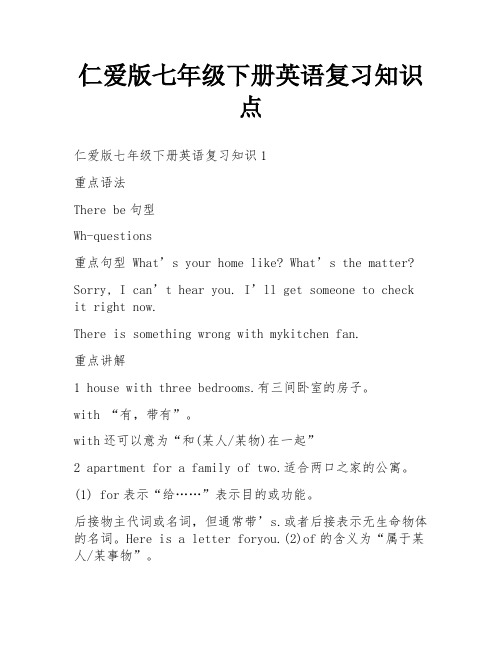
仁爱版七年级下册英语复习知识点仁爱版七年级下册英语复习知识1重点语法There be句型Wh-questions重点句型What’s your home like? What’s the matter?Sorry, I can’t hear you. I’ll get someone to check it right now.There is something wrong with mykitchen fan.重点讲解1 house with three bedrooms.有三间卧室的房子。
with “有,带有”。
with还可以意为“和(某人/某物)在一起”2 apartment for a family of two.适合两口之家的公寓。
(1) for表示“给……”表示目的或功能。
后接物主代词或名词,但通常带’s.或者后接表示无生命物体的名词。
Here is a letter foryou.(2)of的含义为“属于某人/某事物”。
She is a friend of Lily’s. = She is Lily’s friend.3 What’s the matter?怎么了?该句常用来询问某或某物出了什么什么问题或毛病;询问具体某人或某物出了什么问题时,还可以表达为:What’s the matter with sb./sth.某人或某物出了什么毛病。
What’s the matter? = What’swrong?4 Ihear you playing the piano.我听见你在弹钢琴。
hear…doing sth.“听见……在做某事”,强调正在进行的动作。
hear…dosth.“听见……做了某事”,强调全过程。
hearabout sth.听到关于某事物的消息 hear from sb.接到某人的来信、电话等hear of sb./sth.听到或知道某人或某事物的情况5 a lot of = lots of许多后接可数名词,相当于many;后接不可数名词,相当于much,用于肯定句中;但是注意:如果是否定句,则常用many或much.6 be far from… 离……远(抽象距离)be…away from…离……远(具体距离)My school is not far from thebookstore. The sea is 2 miles away fromthe hotel.7 There is something wrong with sb./sth.某人或某物出问题/有毛病了。
仁爱版七年级英语下册单元话题知识点归纳(七)
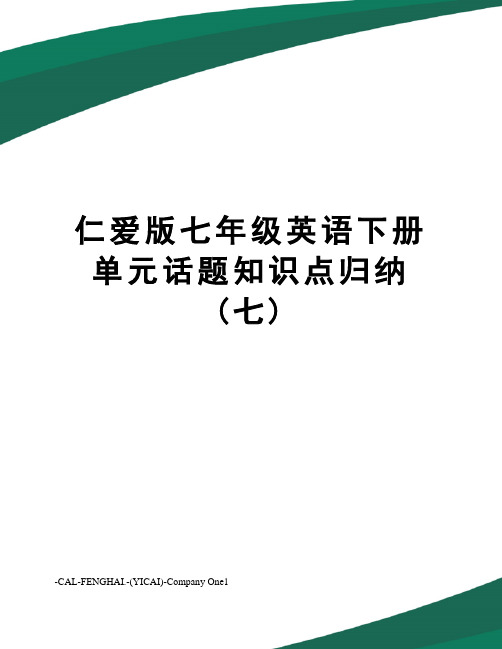
仁爱版七年级英语下册单元话题知识点归纳(七)-CAL-FENGHAI.-(YICAI)-Company One1Unit 7 Topic 1一、重点词汇和短语二、语言点Section A1.When was she born,…他什么时候出生的,……当表达某人出生于某时或某地时,用一般过去时was/ were born。
如:Where were you born 你在哪儿出生的2. she was born in July, 1965 .她出生于1965年7月。
在具体的某日前,用介词on;在月份或年份前用介词in。
如:on April 1st, 2005 在2005年4月1日 in June, 1970 在1970年6月 in 2004 在2004年3.年份的读法:Section B1.When is your birthday, Kangkang 本句中的when是特殊疑问句,表示“什么时候”,有时相当于what time.但是when的适用范围较广,可以对年月日,几时几分等进行提问;而what time常对具体的几点几分进行提问。
When do you want to go to Beijing你想什么时候去北京 What time do you usually go to bed你通常什么时候(指几点钟)睡觉2. —What’s the date today? 今天是几号—It’s May 8th. 5月8日。
What’s the date today?是询问日期的句型3. How do you plan to celebrate it你打算怎样庆祝plan to do sth.打算做某事4.My friends want to have birthday party for me.have a birthday party举办生日聚会5.基数词变序数词的规律1, 2, 3 要牢记, 结尾各是t,d,d;8去t,9去e; ve要用f 替;然后再加th;整十变化需注意, ty变成tie, 后面再加th;假如遇到“几十几”,只变个位就可以Section C1. …what’s the shape of your present 你的礼物是什么形状对物体的形状提问常用句型“What’s the shape of…”What’s the shape of`····= What shape is ·····2.—What color is it它是什么颜色—It’s black and white.是黑白相间的对物体的颜色提问常用句型:What color ·····3. Oh! I get it. I get it. 我猜到了。
仁爱英语七年级下册Unit 7 英语重点短语句子语法梳理
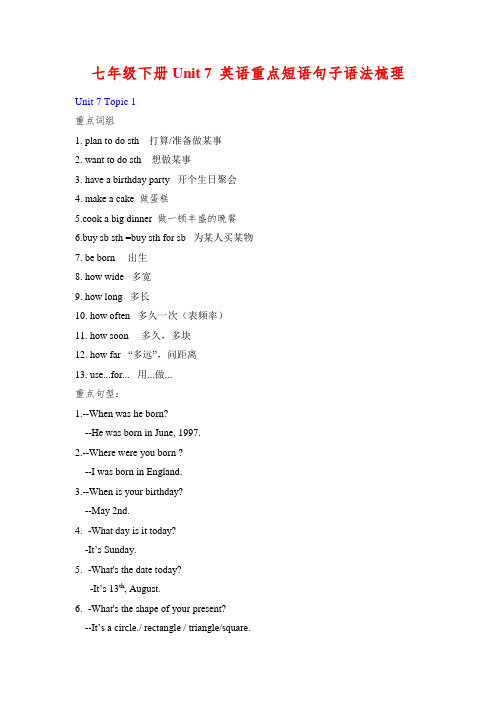
七年级下册Unit 7 英语重点短语句子语法梳理Unit 7 Topic 1重点词组1. plan to do sth 打算/准备做某事2. want to do sth 想做某事3. have a birthday party 开个生日聚会4. make a cake 做蛋糕5.cook a big dinner 做一顿丰盛的晚餐6.buy sb sth =buy sth for sb 为某人买某物7. be born 出生8. how wide 多宽9. how long 多长10. how often 多久一次(表频率)11. how soon 多久,多块12. how far “多远”,问距离13. use...for... 用...做...重点句型:1.--When was he born?--He was born in June, 1997.2.--Where were you born ?--I was born in England.3.--When is your birthday?--May 2nd.4.-What day is it today?-It’s Sunday.5.-What's the date today?-It’s 13th, August.6.-What's the shape of your present?--It’s a circle./ rectangle / triangle/square.7.--How long/wide is it?--It’s...long/wide.8. --What do we use it for?--We use it to study English.9.--What’s it like ?--It’s like a star.重点语法1 英语中日期可以有两种表达法:(1)月日,年。
May 1st, 2008(2)日月,年。
仁爱版英语七年级下册知识点归纳(完整版)
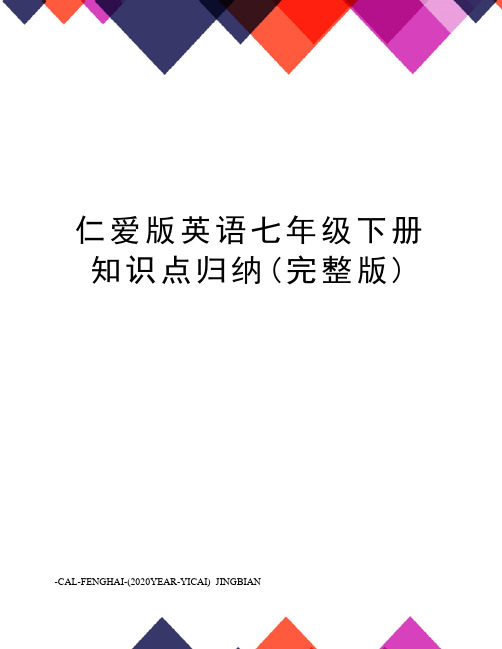
仁爱版英语七年级下册知识点归纳(完整版)-CAL-FENGHAI-(2020YEAR-YICAI)_JINGBIAN仁爱版英语七年级下册知识点归纳?英语七年级下册知识点归纳Unit?5?Topic1?重点语法一般现在时(常与频度副词never,?seldom,?sometimes,?often ,usually,?always等连用)重点句型?—How?do?you?usually?come?to?school???—I?usually?come?to?school?by?subway.????????????—How?often?do?you?go?to?the?library????—Once/Twice/Three?times?a?week/Very?often/Every?day/Seldom重点详解1I?always?come?to?school?by?bus.???by+交通工具名称,表示使用某种交通方式,中间不加限定词,如果交通工具前有a,?the,?my?等限定词,就不能用by,而是用in或是on.???on?the?train=by?train???on?his?bike=by?bike???in?my?car=by?car.???巧辩异同on?foot?与?walk????on?foot?“走路”,是介词短语,不能作谓语,只作方式状语,位于句末。
??walk?“走路”,是动词,可以作谓语。
? ? ??go?to…on?foot=?walk?to? ? ???I?often?go?to?school?on?foot.?=I?often?walk?to?school.?????同样,go?to….by?bike?=?ride?a?bike?to?????? ? ? ? ? go?to….?by?car?=?drive?a?car?to????????? ??go?to?…?by?plane?=?fly?to????????? ? ? ? ? go?to…?by?bus?=?take?a?bus?to2???Come?on!?It’s?time?for?class.???????come?on?“快点,加油,来吧”。
仁爱版初一下册英语知识点总结

【导语】下⾯是⽆忧考为您整理的仁爱版初⼀下册英语知识点总结,仅供⼤家查阅。
Unit 1 Can you play the guitar ?1、can+动词原形,它不随主语和数⽽变化。
(1)含有can的肯定句:主语+can+谓语动词的原形+其他。
(2)变⼀般疑问句时,把can提前:Can+主语+动词原形+其他?肯定回答:Yes,主语+can。
否定回答:No,主语+can't.(3)含有can的否定句:主语+can't+动词的原形+其他。
(4)含有can的特殊疑问句:特殊疑问词+can+主语+动词原形+其他?2、may+动词的原形。
(may为情态动词)⼀般疑问句是把may提前,肯定回答是:Yes,主语 +may。
否定回答是:No,主语+mustn't。
或please don't。
join+某个组织,俱乐部,party,参军,党派等 “加⼊”Join sb. “参加到某⼈中” join in (doing)sth “加⼊做......,参加某个活动” Join in=take part in +活动,⽐赛3、说某种语⾔:speak+语⾔4、play+球、棋、牌;play+the+乐器。
5、擅长于(做)什么:be good at +名词/动ing6、帮助某⼈做某事:help sb. (to ) do sth. help sb. with sth.7、我能知道你名字吗?May I know your name?8、想要做什么:want to do sth 例如:I want to learn about art.9、What club do you want to join?I want to join the chess club and the basketball club.10、What club does Tom want to join? He wants to join the swimming club .11、He can’t play the violin or the piano. Can you help kids with swimming?12、Why do you want to join the English club? Because I want to learn English well.Unit 2 What time do you go to school ?1、what time和when引导的特殊疑问句。
仁爱版英语七年级下册各单元知识点归纳
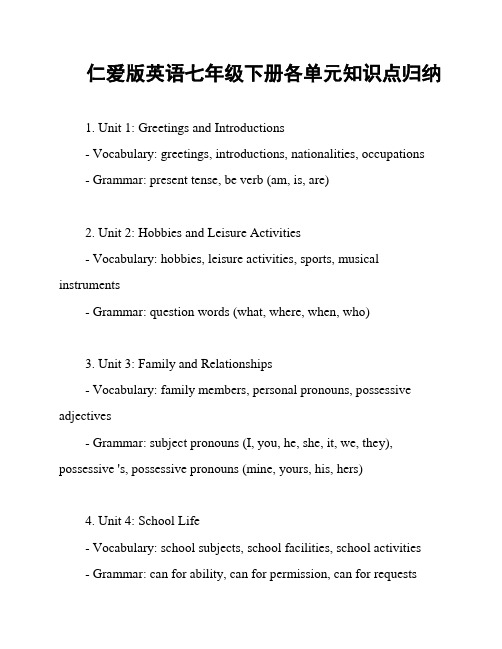
仁爱版英语七年级下册各单元知识点归纳1. Unit 1: Greetings and Introductions- Vocabulary: greetings, introductions, nationalities, occupations- Grammar: present tense, be verb (am, is, are)2. Unit 2: Hobbies and Leisure Activities- Vocabulary: hobbies, leisure activities, sports, musical instruments- Grammar: question words (what, where, when, who)3. Unit 3: Family and Relationships- Vocabulary: family members, personal pronouns, possessive adjectives- Grammar: subject pronouns (I, you, he, she, it, we, they), possessive 's, possessive pronouns (mine, yours, his, hers)4. Unit 4: School Life- Vocabulary: school subjects, school facilities, school activities- Grammar: can for ability, can for permission, can for requests5. Unit 5: Daily Routines- Vocabulary: daily activities, time expressions, adverbs of frequency- Grammar: simple present tense, adverbs of frequency (always, often, sometimes, never)6. Unit 6: Food and Drinks- Vocabulary: food items, drinks, restaurant vocabulary- Grammar: countable and uncountable nouns, quantifiers (some, any)7. Unit 7: Places and Directions- Vocabulary: places in town, prepositions of location, directions- Grammar: imperatives, there is/there are8. Unit 8: Transportation- Vocabulary: means of transportation, travel vocabulary- Grammar: past tense (regular and irregular verbs), past tense of be verb (was, were)以上是仁爱版英语七年级下册各单元的知识点归纳。
2020仁爱版初中英语七年级下册知识点、重点句型、单词归纳
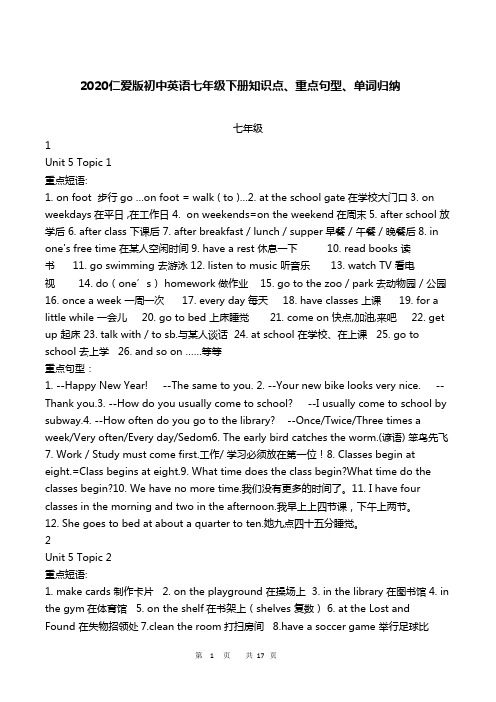
2020仁爱版初中英语七年级下册知识点、重点句型、单词归纳七年级1Unit 5 Topic 1重点短语:1. on foot 步行go …on foot = walk ( to )…2. at the school gate在学校大门口3. on weekdays在平日 ,在工作日4. on weekends=on the weekend在周末5. after school 放学后6. after class 下课后7. after breakfast / lunch / supper早餐 / 午餐 / 晚餐后8. in one's free time在某人空闲时间9. have a rest 休息一下 10. read books 读书 11. go swimming 去游泳 12. listen to music 听音乐 13. watch TV 看电视 14. do(one’s) homework 做作业 15. go to the zoo / park去动物园 / 公园16. once a week 一周一次 17. every day 每天 18. have classes 上课 19. for a little while 一会儿 20. go to bed 上床睡觉 21. come on 快点,加油,来吧 22. get up 起床 23. talk with / to sb.与某人谈话 24. at school 在学校、在上课 25. go to school 去上学 26. and so on ……等等重点句型:1. --Happy New Year! --The same to you.2. --Your new bike looks very nice. --Thank you.3. --How do you usually come to school? --I usually come to school by subway.4. --How often do you go to the library? --Once/Twice/Three times a week/Very often/Every day/Sedom6. The early bird catches the worm.(谚语) 笨鸟先飞7. Work / Study must come first.工作/ 学习必须放在第一位!8. Classes begin at eight.=Class begins at eight.9. What time does the class begin?What time do the classes begin?10. We have no more time.我们没有更多的时间了。
仁爱英语七年级下册知识点归纳总结

仁爱英语七年级下册知识点归纳总结那咱们开始!一、词汇。
1. 好多好多新单词等你认识呢,像“postcard”(明信片)、“hotel”(旅馆)、“bank”(银行),别弄混啦!2. 注意单词的词性哦,比如“swim”(动词:游泳),“swimming”(名词:游泳)。
3. 还有一些容易拼写错误的单词,像“favourite”(最喜欢的),可别少了字母“u”哟。
二、语法。
1. 一般现在时:这可是经常出现的“常客”,要注意主语是第三人称单数时动词的变化,比如“He likes apples.”(他喜欢苹果。
),“like”要加“s”。
2. 现在进行时:“be + doing”这个结构要记牢,“I'm reading a book.”(我正在读书。
),表示正在发生的动作。
3. 介词的用法:“in”“on”“at”可要分清,“in the morning”(在早上),“on the desk”(在桌子上),“at 8 o'clock”(在 8 点)。
三、句型。
1. 日常交际用语不能忘,比如“Nice to meet you.”(见到你很高兴。
),“How are you?”(你好吗?)2. 问路和指路的句型要学会,“Excuse me. Where is the post office?”(打扰一下,邮局在哪里?)“Go along this street and turn left.”(沿着这条街走然后左转。
)四、课文。
1. 多读课文,熟悉里面的句子和表达方式,这样才能更好地掌握知识点。
2. 注意课文中的语音语调,模仿着读,让你的英语更地道。
好啦,这就是仁爱英语七年级下册的主要知识点,加油学习,相信你一定能搞定!。
七年级英语下册重要知识点和语法点归纳仁爱版

Unit5OurSchoolLifetopic1 Howdoyougotoschool?一、重点词语:1.wakeup 醒来,唤醒getup 起床2.gotoschool 去上学gohome回家3.godancing/shopping/skating/swimmi ng 去跳舞;购物、滑冰;游泳godoingsomething可用于表达去进行某种娱乐休闲活动。
4.表示交通方式:onfoot 步行byboat 坐船byship 坐船byair 乘飞机byplane 乘飞机bytrain 坐火车bysubway 搭乘地铁bycar 坐小汽车bybus坐公共汽车bybike 骑自行车5.takethesubway/bus/car搭乘地铁;公共汽车;小汽车6.driveacartowork=gotoworkbycar驾车去上班takeabustowork=gotoworkbybus乘公共汽车去上班gotoschoolonfoot=walktoschool步行去上学7.rideabike/horse 骑自行车;骑马8.afterschool/class 放学以后;下课以后9.playthepiano/guitar /violin弹钢琴;吉他;小提琴playbasketball/soccer/football 打篮球;踢足球;打橄榄球playcomputergames玩电脑游戏playwithacomputer玩电脑playsports 做运动10.nextto 紧挨着,在…旁边11.aplanofmyschool一幅我们学校的平面图12.onweekdays在工作日atweekends 在周末13.havebreakfast/lunch/supper/dinner/ meals吃早餐;中餐;晚餐;正餐;一日三餐haveclasses/lessons/ameeting上课;上课;开会14.watchTV/movies/games/theanimals看电视;电影;比赛;动物readnovels/newspapers/books看小说;报纸;书15.washone’sface /clothes洗脸;衣服16.反义词:up–down,early–late近义词:quickly–fastgetupearly早起belatefor迟到17.thefirst/second/third/fourthday第一;二;三;四天18.cleanthehouse打扫房子19.表示建筑物(尤其学校建筑物):ontheplayground在操场atschool/home/table 在学校;家里;桌旁inacomputerroom/t eachers’office/cl assroombuilding/gym/library/lab/cante en在电脑室;教师办公室;教学楼;体操馆;图书馆;实验室;食堂20.aroundsixo’clock=ataboutsixo’clock大约在六点21.频率副词:never,seldom,sometimes,often,usually, always二、重点句型:1.It’stimetogetup.该起床的时候了。
七年级下册英语仁爱版知识点

七年级下册英语仁爱版知识点智慧,是⼈的知识、胆识、意识与把握客观世界相结合的结果。
知识,学识的深厚、⼴博是基础,胆识是视野、胸怀、⽓质、判断、能⼒结合升华,帷幄运畴才能的表现。
下⾯⼩编给⼤家分享⼀些七年级下册英语仁爱版知识,希望能够帮助⼤家,欢迎阅读!七年级下册英语仁爱版知识1重点句型1. What day is it today?---It’s Sunday. (在英语国家每周的第⼀天是星期天⽽不是星期⼀)2. What class are they having? They are having a music class.3. What time does the class begin? At ten o’clock.4. What do you think of math? = How do you like math ? 你认为数学怎么样?----It’s difficult and boring.5. Why (为什么)do you like English ? Because(因为)it’s easy and interesting.7. What subject (学科)do you like best ? I like history best.8. At school, my teachers and classmates are very friendly to me.9. I study Chinese, English, politics, geography and some other subjects.(other泛指其他的,别的+ 名词复数 another 泛指⼜⼀个、再⼀个、另⼀个+名词单数the other 两者中的另⼀个)10. English is my favorite subject.11. I also like P.E and music. = I like P.E and music , too. (也)12. Can you tell me something about it?重点详解1. 询问星期⼏⽤What day…?回答:It’s Wednesday/Sunday…。
仁爱版七年级下册英语u6知识点
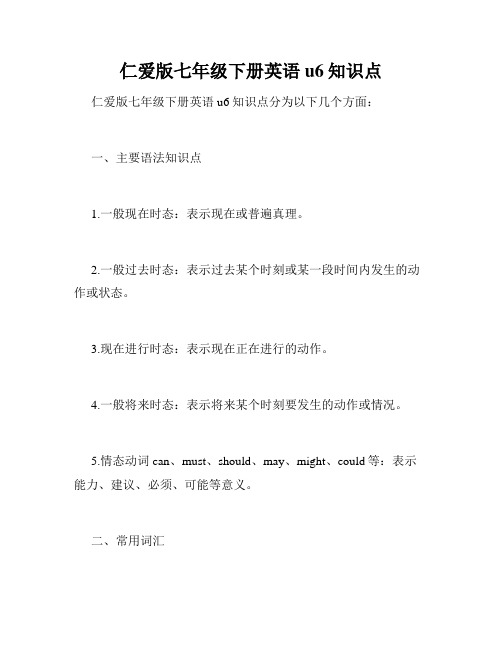
仁爱版七年级下册英语u6知识点仁爱版七年级下册英语u6知识点分为以下几个方面:一、主要语法知识点1.一般现在时态:表示现在或普遍真理。
2.一般过去时态:表示过去某个时刻或某一段时间内发生的动作或状态。
3.现在进行时态:表示现在正在进行的动作。
4.一般将来时态:表示将来某个时刻要发生的动作或情况。
5.情态动词can、must、should、may、might、could等:表示能力、建议、必须、可能等意义。
二、常用词汇根据本单元的主题,以下为常用词汇:1. planet 行星2. cloud 云3. universe 宇宙4. northern 北方的5. southern 南方的6. eastern 东方的7. western 西方的8. degree 度数9. temperature 温度10. frame 框架11. foundation 基础12. layer 层三、常用句型1. What do you think of...? 你认为......怎么样?2. How do you like...? 你喜欢......吗?3. What's the weather like today? 今天天气怎么样?4. It's sunny/cold/warm/hot today. 今天是晴天/冷天/温暖的天气/炎热的天气。
5. I'm interested in... 我对......感兴趣。
6. I think... 我认为......四、重点难点本单元重点难点为一般现在时、一般过去时、现在进行时、一般将来时的区别和使用;情态动词can、must、should、may、might、could的用法;句型What do you think of...?和How do you like...?的使用。
五、小结本单元主要介绍了关于天文学以及天气的相关词汇和语法,帮助学生理解并掌握一般现在时、一般过去时、现在进行时、一般将来时和情态动词can、must、should、may、might、could的用法,提高学生的语言运用能力和交流能力。
仁爱版英语七年级下册知识点总复习
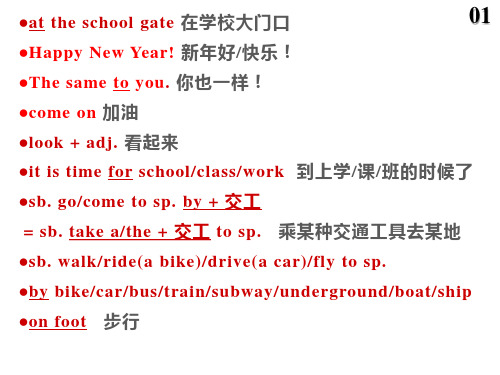
01
●Happy New Year! 新年好/快乐!
●The same to you. 你也一样!
●come on 加油
●look + adj. 看起来
●it is time for school/class/work 到上学/课/班的时候了
●sb. go/come to sp. by + 交工
●There be + n. +介词+地点. 某地有某人/物 08 ●否定句:There be not + n. +介词+地点. ●一般疑问句:Be there + n. +介词+地点? ●回答:Yes, there is/are. No, there isn't/aren't. ●特殊疑问句:What is +介词+地点?
●go to bed/sleep 去睡觉 go fishing 去钓鱼
●go swimming = go to swim 去游泳
●once/twice/three times a week 一周一/两/三次
03
●at school/home 在学校/家 school life 校园生活
●know 知道/认识 know about 了解
●Work must come first. 工作第一。
●eat out 外出吃饭/下馆子吃饭
●go out (for a walk/picnic) 外出(散步/野炊)
●sb. be + v-ing+介词+地点 现在进行时
04
●make cards 制作卡片 talk on the phone 打 电话
- 1、下载文档前请自行甄别文档内容的完整性,平台不提供额外的编辑、内容补充、找答案等附加服务。
- 2、"仅部分预览"的文档,不可在线预览部分如存在完整性等问题,可反馈申请退款(可完整预览的文档不适用该条件!)。
- 3、如文档侵犯您的权益,请联系客服反馈,我们会尽快为您处理(人工客服工作时间:9:00-18:30)。
仁爱版英语七年级下册知识点梳理Unit 5 Topic1重点短语:1. on foot 步行go …on foot = walk ( to )…2. at the school gate在学校大门口3. on weekdays在平日,在工作日4. on weekends=on the weekend在周末5. after school 放学后6. after class 下课后7. after breakfast / lunch / supper早餐/ 午餐/ 晚餐后8. in one's free time在某人空闲时间9. have a rest 休息一下10. read books 读书11. go swimming 去游泳12. listen to music 听音乐13. watch TV 看电视14. do(one’s)homework 做作业15. go to the zoo / park去动物园/ 公园16. once a week 一周一次17. every day 每天18. have classes 上课19. for a little while 一会儿20. go to bed 上床睡觉21. come on 快点,加油,来吧22. get up 起床23. talk with / to sb.与某人谈话24. at school 在学校、在上课25. go to school 去上学26. and so on ……等等重点句型:1. --Happy New Year!--The same to you.2. --Your new bike looks very nice.--Thank you.3. --How do you usually come to school?--I usually come to school by subway.4. --How often do you go to the library?--Once/Twice/Three times a week/Very often/Every day/Sedom 6. The early bird catches the worm.(谚语) 笨鸟先飞7. Work / Study must come first.工作/ 学习必须放在第一位!8. Classes begin at eight.=Class begins at eight.9. What time does the class begin?What time do the classes begin?10. We have no more time.我们没有更多的时间了。
11. I have four classes in the morning and two in the afternoon.我早上上四节课,下午上两节。
12. She goes to bed at about a quarter to ten.她九点四十五分睡觉。
Unit 5 Topic2重点短语:1. make cards 制作卡片2. on the playground 在操场上3. in the library 在图书馆4. in the gym在体育馆5. on the shelf在书架上(shelves 复数)6. at the Lost and Found 在失物招领处7.clean the room打扫房间8.have a soccer game 举行足球比赛9. have an English class 上英语课10. write a letter 写信11. some of his photos= some photos of his 他的一些照片12. on time 准时/in time及时13. do better in sth 在某方面做得较好14. show sb. around… 带领某人参观……15. at the moment“此刻,现在”= now.16. plan v.计划plan to do sth17. be kind to sb=be friendly to sb 对某人很友好学科名词:学科名词:重点句型:1. --What are you doing?-- He is cleaning the dormitory.2.-- Are you doing your homework?--Yes, I am./No, I am not.3. --How long can I keep them?--Two weeks.4. --Thank you.--It’s a pleasure/A pleasure / My pleasure.别客气。
5. --Sorry, I don’t have any.--Thank you all the same.仍然感谢你。
Unit 5 Topic3重点短语:1. outdoor activity 课外活动2. easy and interesting 容易又有趣3. difficult and boring 又难又乏味4. be friendly to sb. =be kind to sb.对某人友好5. between…and… 在……之间…6. learn(…)from… 向…学习…/从…中学…7.learn about the past了解过去8.learn about了解9.learn by oneself自学7. from…to… 从……到……8. in the morning / afternoon / evening在早上/ 下午/ 晚上9. on Monday 在星期一10. on Monday morning在星期一的早上11. tell sb. about sth告诉某人关于某事重点句型:1. --What day is it today?--It’s Sunday. (在英语国家每周的第一天是星期天而不是星期一)2. --What class are they having?--They are having a music class.3. --What time does the class begin?--At ten o’clock.4. --What do you think of math? / How do you like math ?你认为数学怎么样?--It’s difficult and boring.5. --Why (为什么)do you like English ?--Because(因为)it’s easy and interesting.7. --What subject (学科)do you like best ?--I like history best.8. At school, my teachers and classmates are very friendly to me.9. I study Chinese, English, politics, geography and some other subjects.(other泛指其他的,别的+ 名词复数. another 泛指又一个、再一个、另一个+名词单数.the other 两者中的另一个)10. English is my favorite subject.11. I also like P.E and music.I like P.E and music , too. (也)12. Can you tell me something about it?Unit 6Topic1重点词组:Why not… =Why don’t you…go upstairs上楼go downstairs下楼A moment later一会以后study n.书房v.学习in the front of the house在屋子(里面的)前面in front of the house在屋子(外面的)前面talk about+n/v-ing谈论,议论,讨论某事talk with sb. 与某人交谈put them away 把他们收拾好Look after = take care of照顾play with sb.“与某人一起玩”in the tree(外物附着)在树上on the tree 树本身长出来的花,树叶等on the wall在墙上in the wall 在墙里on the river浮在水面上over the river 在河上(悬空)tell sb about sth告诉某人关于某事tell sb to do sth 让某人做某事tell sb sth告诉某人某事want to do sth.想要做某事重点句型:1.There are two bedrooms and a small study.有两张床和一个小的书房。
2.There is a lamp, a computer, some books and so on.有一个台灯,一个电脑,一些书等等。
3.—Is there a computer in your study?在你的书房有一台电脑吗?—Yes, there is.是的,有。
4.Don't put them here. Put them away.不要把他们放这儿,把他们收拾起来5.There are many beautiful flowers in the garden, but there aren’t any trees in it. 花园里有许多漂亮的花,但是却没有树。
Unit6 Topic2重点词组:1. live with sb. 和某人居住在一起2. in the country 在农村3. look for 寻找4. for rent 出租5.excuse me打扰了,打扰一下,劳驾,请原谅6.on the street corner在街道拐角处7.train stationn 火车站8.park cars 停车9.keep money 存钱10.right now 立刻,马上11.from... to... 从……到……12. take trains 乘火车13. see a doctor 看医生14. mail letter 邮寄信15. at the end of ...在……的尽头16. on the right 在右边17. lot of = lots of 许多18. close to 距离……近,紧挨着的19. far from距离……远20. kitchen fan 厨房排气扇21. get sb. to do sth.派人去做某事22.a ticket for speeding 超速罚单23.go across穿过24.turn left/right向左转/向右转25.on the corner of 在…转角/拐弯处26.across from 在…对面27.betwe en……and 在…之间28.take the No. 718 bus 乘坐718路公共汽车重点句型:1.--What’s your home like?你的家是什么样的?--It’s an apartment building.它是一栋公寓楼。
